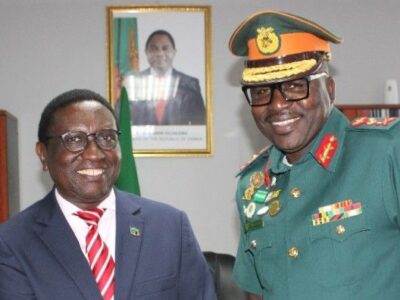The International Monetary Fund (IMF) says that it has reached a staff-level agreement with Zambia on the Second Review of the Extended Credit Facility (ECF) arrangement, paving way for US$184 million funding.
This is part of the arrangement that was approved by the IMF Executive Board on August 31, 2022, for a total amount of Special Drawing Rights (SDR) 978.2 million, about US$1.3 billion.
In statement issued from Washington DC, and made available to Zambia Monitor in Lusaka, it stated that a staff team from the IMF, led by Vera Martin, IMF Mission Chief for Zambia, visited Lusaka from October 25 to November 8, 2023.
Martin while in Lusaka discussed the progress on economic and financial policies in the context of the Second Review under ECF arrangement.
Read more: $1.3bn IMF Deal: Zambia’s Performance to be Gauged in 2023
The programme was based on Zambia’s homegrown economic reforms that aimed to restore macroeconomic stability and debt sustainability, and foster higher, more resilient, and more inclusive growth.
Martin said: “I am pleased to announce that the Zambian authorities and IMF staff team reached a staff-level agreement on the second review of Zambia’s economic program under the ECF arrangement.
“The staff-level agreement is subject to IMF Management approval and Executive Board consideration,” she said.
Martin stated that upon completion of the Executive Board review, Zambia would have access to SDR 139.9 million (about US$184 million), bringing the total IMF financial support disbursed under the arrangement to SDR 419.6 million (about US$555.7 million).
“Amidst challenging conditions, the Zambian economy has performed better than anticipated. Growth is expected to reach 4.3 percent in 2023 as non-mining non-agricultural growth is more than compensating for weak mining production this year.
Martin touched on inflation pressures persisting despite a tighter monetary stance by the Bank of Zambia, driven by higher food and fuel prices and a sustained depreciation of the exchange rate.
She added that the current account balance was projected to deteriorate to a deficit of 1.8 percent of Gross Domestic Product (GDP) in 2023, driven by lower mining exports receipts and strong import growth.
Martin further indicated that the medium-term outlook remained favorable, supported by expanding mining production and the completion of the debt treatment plan, and hinges on proactive reform efforts.
She, however, noted that in a context of elevated global uncertainty, external downside risks arising from a weakened global economic outlook, commodity prices volatility and regional conflicts, prudent economic policies were warranted.
“The Zambian authorities have made progress in implementing reforms under the Fund-supported programme, including significant fiscal efforts in 2023, which are expected to continue in 2024, to address lower mining revenues.
“The primary balance (cash basis) in 2023 is projected at 0.2 percent of GDP, in line with programme parameters. Fiscal targets for end-June were met supported by lower current spending and higher nonagricultural and non-mining revenues,” she said.
Despite the consolidation, Martin said the authorities have upscaled social spending to support the most vulnerable and continue to provide free primary education.
She advised the authorities that near-team reform priorities should focus on perennial revenue measures and better cash and liability management that would reduce the financing needs, crucial to restore fiscal space and debt sustainability.
In addition, she pointed out that strengthening tax administration, removing tax exemptions and actively combating tax evasion can also contribute to improved revenues and governance.
“Further tightening of monetary policy may be needed to contain inflationary pressures, while building reserves will enhance external resilience.
“The Bank of Zambia pursues reforms to enhance the effectiveness of monetary policy transmission through strengthening the monetary policy framework and its governance. The Bank of Zambia is also working on strengthening the banking sector and promoting financial inclusion,” Martin explained.
She also touched on the improving the business climate, which she said remained key for economic diversification and private sector-led growth.
This, Martin, said relied on continued efforts towards improving the anti-corruption framework and battling Anti-Money Laundering and Combating the Financing of Terrorism; enhancing transparency, including in the energy and agricultural sector and publishing beneficial ownership information for awarded government contracts.
“We welcome the agreement on the MoU reached with official creditors and ongoing discussions with private creditors to reach an agreement on a debt treatment. We look forward to the authorities’ continued efforts to reach an agreement with all creditors in line with program parameters,” Martin said.
She thanked the Zambian authorities for the open and productive discussions.
The team met with Minister of Finance and National Planning, Situmbeko Musokotwane, Governor Denny Kalyala, Secretary to the Cabinet, Patrick Kangwa, Secretary to the Treasury, Felix Nkulukusa, Deputy Governor, Francis Chipimo, other senior government officials, representatives of the private sector, civil society organizations and development partners.
WARNING! All rights reserved. This material, and other digital content on this website, may not be reproduced, published, broadcast, rewritten or redistributed in whole or in part without prior express permission from ZAMBIA MONITOR.











Comments